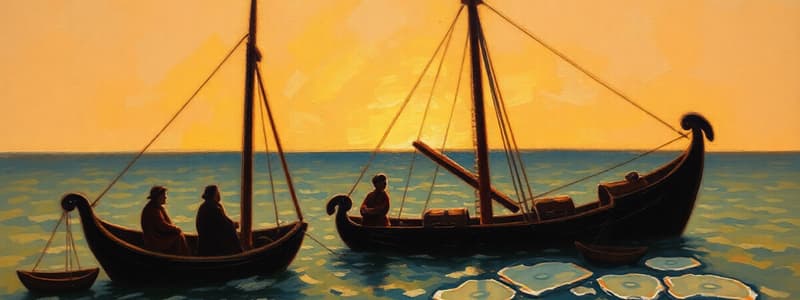Podcast
Questions and Answers
What invention helped sailors determine their position in relation to the equator?
What invention helped sailors determine their position in relation to the equator?
- Astrolabe (correct)
- Caravel
- Magnetic compass
- Cartography
Which ship design improved survival in storms compared to earlier ships?
Which ship design improved survival in storms compared to earlier ships?
- Frigate
- Galleon
- Cormorant
- Caravel (correct)
What was a significant demographic pressure that pushed Europeans to explore and trade?
What was a significant demographic pressure that pushed Europeans to explore and trade?
- Lack of food and jobs (correct)
- A decline in population
- Religious homogeneity in Europe
- Increase in wealth from land ownership
Which type of traders posed competition to European explorers in the Indian Ocean during the 16th century?
Which type of traders posed competition to European explorers in the Indian Ocean during the 16th century?
What was one of the main motives for European involvement in the Indian Ocean trade during the 16th century?
What was one of the main motives for European involvement in the Indian Ocean trade during the 16th century?
What social structure limited land ownership among wealthy sons in Europe?
What social structure limited land ownership among wealthy sons in Europe?
What was one outcome of Columbus's voyages across the Atlantic Ocean?
What was one outcome of Columbus's voyages across the Atlantic Ocean?
Which valuable products were obtained from the Americas by European traders?
Which valuable products were obtained from the Americas by European traders?
What was one significant outcome of the trade with Africa during this period?
What was one significant outcome of the trade with Africa during this period?
Who was a prominent figure in the development of navigation technologies in Portugal?
Who was a prominent figure in the development of navigation technologies in Portugal?
What role did women play in Southeast Asia's trade as compared to European contexts?
What role did women play in Southeast Asia's trade as compared to European contexts?
Which invention significantly aided European navigators in determining their latitude?
Which invention significantly aided European navigators in determining their latitude?
What was the primary function of the lateen sail in maritime exploration?
What was the primary function of the lateen sail in maritime exploration?
How did Newton's discovery of gravitation influence navigation?
How did Newton's discovery of gravitation influence navigation?
Which type of ship was primarily used by the Portuguese during the 14th to 17th centuries for trade?
Which type of ship was primarily used by the Portuguese during the 14th to 17th centuries for trade?
What technological advancement was made to improve navigation before the magnetic compass was widely used?
What technological advancement was made to improve navigation before the magnetic compass was widely used?
What was the primary advantage of the magnetic compass for sailors?
What was the primary advantage of the magnetic compass for sailors?
What was a major limitation of the square sails compared to the lateen sails?
What was a major limitation of the square sails compared to the lateen sails?
What major impact did advances in cartography have on navigation?
What major impact did advances in cartography have on navigation?
Which European nation was noted for its early exploration efforts along Africa's Atlantic Coast?
Which European nation was noted for its early exploration efforts along Africa's Atlantic Coast?
What long-term consequence did the combination of navigational techniques have?
What long-term consequence did the combination of navigational techniques have?
Flashcards are hidden until you start studying
Study Notes
Cross-Cultural Interactions
- European exploration and trade were facilitated by cross-cultural interactions and transfer of knowledge from China, the Islamic world, and the Classical world.
Technological Innovations
-
Europeans combined their knowledge of Classical sailing with new ideas from Islamic and Asian sailors.
-
Important inventions included the astrolabe (improved by Muslim navigators), the magnetic compass (originally from China), and the lateen sail (used by Arab sailors in the Indian Ocean).
-
Technological innovations like the caravel, a small, three-masted sailing ship developed by the Portuguese in the 15th century, allowed for better navigation and survival at sea.
-
The fluyt, a Dutch ship designed for efficient cargo transport, made trade more profitable.
-
Cartography and knowledge of wind patterns improved navigation and made sea travel safer.
Global Trade and its Impacts
-
European expansion into the Indian Ocean in the 16th century led to competition with Middle Eastern traders.
-
Christopher Columbus's voyages connected the Americas to Afro-Eurasia.
-
The Columbian Exchange facilitated the exchange of goods and ideas between Europe, the Americas, Africa, and Asia, transforming Europe into maritime empires.
-
Key trade items included sugar, tobacco, rum, enslaved Africans, silk, spices, and rhubarb.
Spread of Navigational Techniques
-
The lateen sail, which could catch the wind on either side of the ship, allowed sailors to travel in different directions and expand trade routes.
-
Newton's discovery of gravitation improved understanding of tides, making sea travel safer.
-
Astronomical charts , developed by ancient civilizations like Babylonia, Mesopotamia, and China, helped guide ships.
-
The widespread use of telescopes in the 17th century improved astronomical chart creation, aiding in navigation.
Other Technological Innovations
-
The rudder, another invention from China, made ships more maneuverable.
-
Gunpowder (originally from China) was adopted by Europeans for conquest and was also used by pirates like the Dutch Sea Beggars.
Long-Term Consequences
-
The combination of European and other navigational techniques led to rapid expansion of exploration and global trade.
-
The growth of the Abbasid Empire and interactions among various cultures in Africa led to the spread of Islam in North Africa and along the east coast of the continent.
-
Tsar Peter the Great of Russia visited Western Europe to learn about military and naval technology, leading to an increase in Russia's military and naval power.
Studying That Suits You
Use AI to generate personalized quizzes and flashcards to suit your learning preferences.




